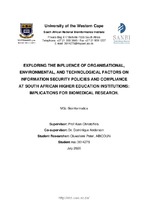| dc.contributor.advisor | Christoffels, Alan | |
| dc.contributor.advisor | Anderson, Dominique | |
| dc.contributor.author | Abiodun, Oluwafemi Peter | |
| dc.date.accessioned | 2021-03-25T09:28:24Z | |
| dc.date.available | 2021-03-25T09:28:24Z | |
| dc.date.issued | 2020 | |
| dc.identifier.uri | http://hdl.handle.net/11394/8043 | |
| dc.description | >Magister Scientiae - MSc | en_US |
| dc.description.abstract | Headline reports on data breaches worldwide have resulted in heightened concerns about information security vulnerability. In Africa, South Africa is ranked among the top ‘at-risk’ countries with information security vulnerabilities and is the most cybercrime-targeted country. Globally, such cyber vulnerability incidents greatly affect the education sector, due, in part, to the fact that it holds more Personal Identifiable Information (PII) than other sectors. PII refers to (but is not limited to) ID numbers, financial account numbers, and biomedical research data. | en_US |
| dc.language.iso | en | en_US |
| dc.publisher | University of Western Cape | en_US |
| dc.subject | Biomedical data | en_US |
| dc.subject | Information security and management | en_US |
| dc.subject | South African universities | en_US |
| dc.subject | TOE framework | en_US |
| dc.subject | GDPR | en_US |
| dc.title | Exploring the influence of organisational, environmental, and technological factors on information security policies and compliance at South African higher education institutions: Implications for biomedical research. | en_US |
| dc.rights.holder | University of Western Cape | en_US |

